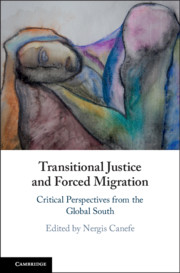Book contents
- Transitional Justice and Forced Migration
- Transitional Justice and Forced Migration
- Copyright page
- Dedication
- Contents
- Contributors
- Preface
- Acknowledgements
- Abbreviations
- In Lieu of an Introduction
- Part I The Past as the Memory of the Future
- 1 Borderlands of Independent India
- 2 A Restorative Justice Approach to the “Armenian Problem”
- 3 Hybrid Courts, Transitional Justice, and Displacement in the Global South
- Part II Law, Justice, and Hope
- Part III Ethics of Witnessing
- Index
- References
2 - A Restorative Justice Approach to the “Armenian Problem”
Transitional Justice between Past and Future
from Part I - The Past as the Memory of the Future
Published online by Cambridge University Press: 24 October 2019
- Transitional Justice and Forced Migration
- Transitional Justice and Forced Migration
- Copyright page
- Dedication
- Contents
- Contributors
- Preface
- Acknowledgements
- Abbreviations
- In Lieu of an Introduction
- Part I The Past as the Memory of the Future
- 1 Borderlands of Independent India
- 2 A Restorative Justice Approach to the “Armenian Problem”
- 3 Hybrid Courts, Transitional Justice, and Displacement in the Global South
- Part II Law, Justice, and Hope
- Part III Ethics of Witnessing
- Index
- References
Summary
The periods in which political and social life lead to great grievances are candidates to be either forgotten or remembered. When it comes to forgetting or remembering the events and their victims, both endeavors are shaped by the search for a stable account. And yet, with reference to both individual and societal suffering, to seek ways of returning to the old and the closing of a dilemma of whether to remember or to forget is not always possible. Coping with this kind of pain in an individual sense and trying to survive it despite all that remains unresolved is probably a condition that falls more under the purview of the field of clinical psychology, which is beyond the scope of this chapter. Within the politics of justice, on the other hand, the aim is eliminating or reducing the effects of victimization; and this is the subject matter of the following pages.
- Type
- Chapter
- Information
- Transitional Justice and Forced MigrationCritical Perspectives from the Global South, pp. 33 - 51Publisher: Cambridge University PressPrint publication year: 2019



